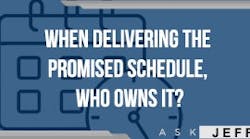Dana, maintenance planner, AZ
Answer: Dana, great question. I’ll approach it from a RASI (responsibility, accountability, support or consult, and information) perspective to start.
- Responsible – maintenance supervisor
- Accountable – maintenance manager
- Support – planner-scheduler, production gatekeeper or supervisor, technicians
- Information – management (in charge of keeping team members in the loop)
There is a saying that the maintenance supervisor is responsible for the success of this week; the planner-scheduler is responsible for the success of next week. What this means is that the focus of the maintenance supervisor is tactical, zeroed in on today, this week. Once the schedule is committed (locked) for metric calculations and transitioned to the current week, the schedule belongs to the maintenance supervisor.
While the maintenance supervisor can allow break-ins to the schedule (assuming the break-in work is of a higher priority than what is on the schedule), his or her focus must be executing the schedule to completion. The supervisor adjusts the work and assigns work by day to ensure we do what we said we were going to do the week prior. Depending on the organization, assigning work may include the authority to assign overtime or to acquire additional resources as well to get the current week’s work accomplished.
To measure our success, we are looking for schedule compliance in at least the 85%–90% range with 100% of the available labor hours. We track schedule break-ins and discuss them at the next weekly scheduling meeting to determine whether these items could have been placed on the schedule in advance and not been schedule-breakers. Remember that we have a goal of 90% planned work to 10% unplanned reactive work. We need to focus on eliminating unplanned work to bring order to the reactive chaos that many of you struggle with daily. If we knew about it two weeks ago, why was it not the schedule? If it was an unexpected failure, what can we do to prevent a similar situation in the future, so we are not surprised?
The planner-scheduler (or the scheduler, if it's a separate function) should focus on future work for next week and beyond. This person should not be massaging the schedule in the current week. He or she should focus on delivering a robust schedule for the coming weeks. The scheduling activity includes addressing the coordination of those activities across the crafts or contractors. We often forget about coordination of crafts to execute the work, especially if there are craft-specific planner-schedulers.
Are you focused in the same manner within your organization? Of more importance, what do you find works the best and why? Please post your comments or questions so that others can learn.
Talk soon,
Jeff Shiver, CMRP
If you have questions in the fields of maintenance, reliability, planning and scheduling, MRO storerooms, or leadership as examples, please contact Jeff Shiver with your question(s) here.


